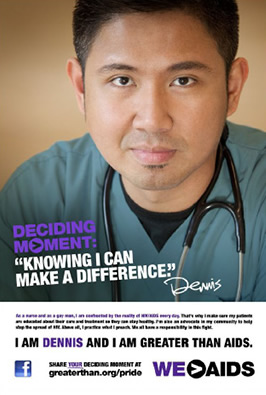Dennis Flores was a toddler in the Philippines when the first cases of AIDS were reported nearly 31 years ago.
In the years since, he developed an appreciation for how AIDS affects the gay community.
The graduate nursing student and HIV/AIDS nurse is one of the newest spokespersons for Greater Than AIDS. Led by the Kaiser Family Foundation and Black AIDS Institute, the movement aims to increase knowledge and reduce stigma through national media and community outreach. Flores (shown left) is featured in the "Deciding Moments" campaign, which focuses on everyday opportunities to take a stand against the disease. Outlets include an online video, public service ads in national magazines, billboards, and other outdoor placements.
 | |
Flores points to several deciding moments in his own career. Although his mother initially urged him to become a nurse, he chose instead to work as a social worker in Georgia. Several years later, nursing came knocking again after a health scare in his family. This time, he was ready.
"My mother will never let me live that down," says Flores, an MSN student in public health nursing leadership. "But I knew the time was right and that it was a good fit."
During nursing school at Kennesaw State University, he took a community health course and was hooked. He also did a clinical rotation in the HIV/AIDS unit at Grady Memorial Hospital, where he now works as a charge nurse on weekends.
"I realized that HIV/AIDS was something I could relate to," he says. "As a gay man, I owe it to the generations of men before me who suffered through the early days of the epidemic. In return, someone has to uphold their legacy and take care of the community they built."
Flores just completed a term as president of the Atlanta chapter of the Association of Nurses in AIDS Care. Last fall, he co-wrote his first article in the Journal of the Association of Nurses in AIDS Care. The title, "Get Them While They’re Young: Reflections of Gay Men Newly Diagnosed with HIV Infection," stems from his interviews with young HIV-positive gay men. Although his study participants understood the risks associated with unprotected sex, they did not take the necessary precautions or believe that HIV could happen to them. Flores sought to understand why.
"There is a distinction between being sick and having to deal with it for the rest of your life," he says. "A lot of young gay adults can’t make that distinction because HIV/AIDS is now a manageable disease. The question is why would you subject yourself to a chronic condition if you can be healthy otherwise?"
The answer lies in creative interventions to raise awareness, such as more inclusive sex education in schools and community tactics like Greater Than AIDS.
"We need more aggressive efforts to keep people from becoming infected," says Flores. "There are some great programs out there. But the mentality of younger people who are at risk of AIDS is not the same as the first people who had to confront it. We have to adapt to these changes in mindset and keep AIDS in the public consciousness to make it as relevant as possible."
